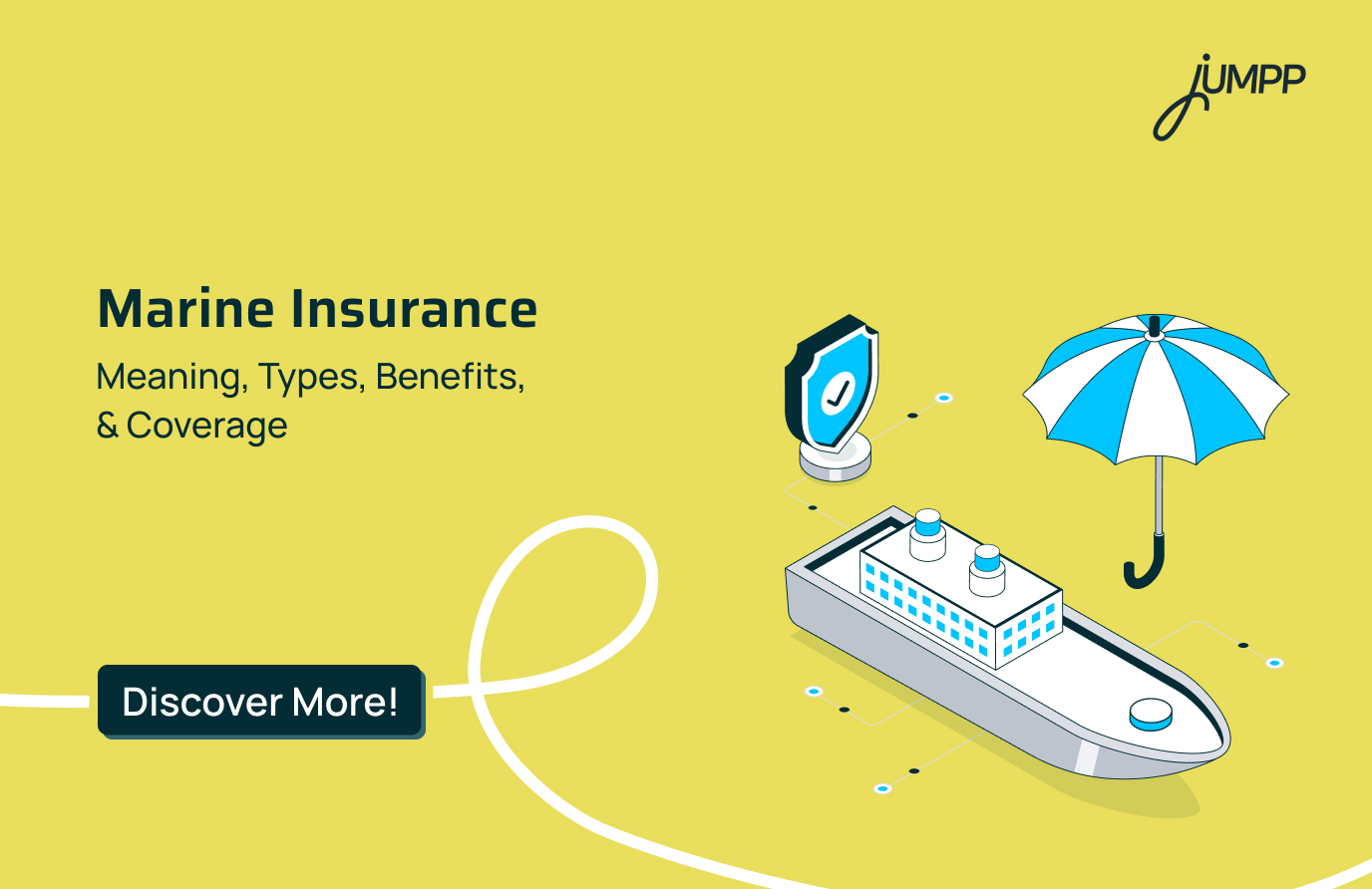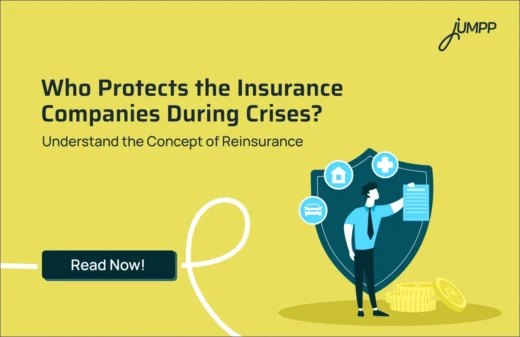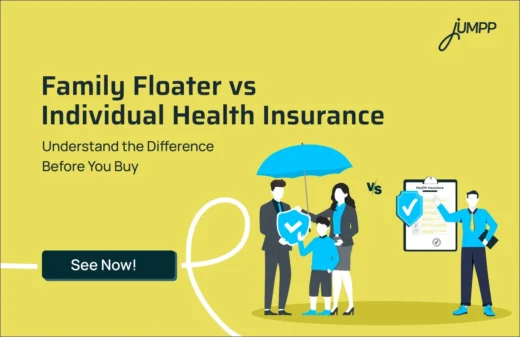What is Marine Insurance- Types, Features, and Coverage

Every day, products like electronics, food, textiles, or raw materials travel thousands of miles before reaching you. A mishap along the way can mean loss for suppliers, retailers, and consumers like us. How is the loss covered? Marine insurance is the solution. It provides a financial safety net for such goods that travel by sea, air, rail, or road. This is basically a type of general insurance.
Let’s understand the marine insurance meaning in detail and understand the importance of marine cargo insurance in today’s time!
What is Marine Insurance?
Marine insurance is a contract of indemnity. It is designed to protect the financial interests of businesses and individuals against the loss or damage of ships, cargo, and other goods during transit.
Traditionally, it was associated with sea travel. However, today, marine insurance extends to multiple modes of transport. This includes sea, air, road, rail, and inland waterways.
Marine Insurance Meaning
Marine insurance is basically a type of general insurance. It has been introduced as a protection against financial loss or damage to vessels, cargo, and property while in transit by sea, air, road, or rail.
See how general insurance protects your assets beyond shipping? Link to insurance basics blog
Marine Insurers in India
Some of the leading marine insurance providers in India include IFFCO Tokio Marine Insurance, Tata AIG General Insurance, ICICI Lombard General Insurance, New India Assurance, United India Insurance, Oriental Insurance Company, Chola MS General Insurance, SBI General Insurance, Bajaj Allianz General Insurance, HDFC ERGO General Insurance, Reliance General Insurance, and Universal Sompo General Insurance.
What are the Types of Marine Insurance
Marine insurance is not a single product. It is a broad category of policies.
Here are various types of marine insurance-
1. Based on Subject Matter
Hull and Machinery (H&M) Insurance
This policy covers the vessel itself, including machinery and equipment. It is taken against physical damage that could arise from perils such as collisions, grounding, and storms.
Marine Cargo Insurance
This is the most common form of marine insurance. It protects goods being transported against loss, damage, or theft.
Marine insurance is a broad category that protects against a variety of risks involved in transporting goods. It can cover the vessel itself through hull insurance, legal liabilities, and the cargo being transported.
Marine cargo insurance, on the other hand, is a specific type of marine insurance that focuses solely on the goods in transit, whether by sea, air, or land. This makes it a subset of the broader marine insurance policy.
Freight Insurance
This policy covers financial losses incurred by carriers when freight charges are not received due to cargo damage or loss during transit.
Liability Insurance (Protection and Indemnity – P&I)
This provides coverage for legal liabilities arising from a ship’s operation, including third-party damages, injuries, or environmental pollution.
2. Based on Policy Duration and Scope
Voyage Policy
A short-term policy covering goods for a specific single transit from origin to destination.
Time Policy
This policy insures the subject matter (like a vessel) for a fixed period, usually one year.
Floating Policy (Open Policy)
This is designed for businesses with frequent shipments. It provides automatic coverage for all shipments within a specified period, often 12 months, up to a maximum insured amount.
Annual Sales Turnover Policy (STOP)
This covers a company’s total projected sales turnover over a year.
Mixed Policy
A combination of a voyage and time policy, offering coverage for a defined period and route.
What are the Features of Marine Insurance
Marine insurance has its distinct features that differentiate it from other types of insurance:
- Contract of Indemnity: The compensation is limited to the actual financial loss incurred. This helps in preventing profit from insurance claims.
- Insurable Interest: The policyholder must have a legal financial interest in the insured property at the time of loss.
- Utmost Good Faith (Uberrimae Fidei): Both parties must disclose all material facts truthfully.
- Proximate Cause: Claims are evaluated based on the dominant cause of loss.
- Subrogation: After compensating the loss, insurers may recover the amount from a third party responsible for the damage.
- Contribution: If multiple policies cover the same risk, all insurers share the loss proportionately.
Marine Insurance: Coverage, Exclusions, and Variants
It protects cargo, vessels, and related interests against loss or damage during transit from specified perils. It does not cover predictable, preventable, or commercial risks such as delays, poor packing, or normal wear and tear.
Covered and Non-Covered in Marine Insurance Policy: What You Should Know?
The scope of coverage varies depending on the type of policy. This if often defined by the Institute Cargo Clauses:
- Clause A: Broad “all risks” coverage
- Clause B: Intermediate coverage
- Clause C: Basic, named-perils coverage
War and strikes are typically excluded unless separately insured with an additional premium.
What Marine Insurance Covers
Loss or damage to cargo:
- Fire, explosion, stranding, grounding, sinking, capsizing
- Named-perils coverage under Clause C specifies the exact risks covered
Accidents to conveyances:
- Collision, overturning, or derailment of land transport linked to the voyage
- Discharge at port due to distress may also be covered
Broad “all risks” coverage (Clause A):
- Theft, non-delivery, breakage, chipping, denting, water damage
- Includes perils beyond Clauses B and C, subject to standard exclusions
Losses during loading/unloading:
- Mishandling that causes total loss, if included in the policy wording or endorsements
Natural calamities:
- Floods, lightning, earthquakes, when included under “all risks” terms
Perils like piracy or collisions:
- Coverage may fall under cargo, hull, or P&I (protection & indemnity)/liability policies, depending on the product and endorsements
What Marine Insurance Does Not Cover
Commercial and predictable risks:
- Delay, loss of market, or deterioration due to late arrival
- Ordinary leakage, normal weight/volume loss, wear and tear
Preventable risks:
- Inadequate or unsuitable packing not arranged by the insurer
Willful or fraudulent acts:
- Intentional acts by the insured, including fraud or criminal acts
Financial risks:
- Insolvency or default of vessel owners, managers, charterers, or operators, unless specifically insured
War, strikes, riots, and civil commotions:
- Typically excluded under standard clauses, but can be added via separate coverage
Did you know that your claim amount in marine or general insurance can depend on the deductible you choose?
Understand how a deductible in insurance affects your coverage and premium in detail — read our complete guide on deductible in insurance.
Common Add-ons and Variants
War and strikes coverage:
- Purchased separately for higher-risk routes
Policy tailoring:
- Businesses often combine multiple policies for comprehensive protection, including:
- Cargo insurance
- Hull insurance (vessel damage)
- P&I liability (third-party claims)
- Freight and loss of hire coverage
This flexibility allows businesses to match coverage to their specific maritime risks effectively.
Just as marine insurance safeguards shipments, smart investing protects your financial future. Check out the best app to invest and grow your portfolio smoothly.
What is the Importance of Marine Insurance
Marine insurance plays an important role in global trade and business continuity:
- Risk Mitigation: It protects against accidents, theft, and natural disasters.
- Facilitates International Trade: Marine insurance encourages global transactions by offering financial security.
- Ensures Business Continuity: Compensations allow businesses to recover and operate smoothly.
- Legal and Contractual Compliance: Many trade agreements require marine insurance under Incoterms like CIF and CIP.
CIF – Cost, Insurance, and Freight
CIP – Carriage and Insurance Paid To
What is the Difference Between Fire Insurance and Marine Insurance
Both types of general insurance protect valuable assets. But one protects our property on land while the other safeguards goods and vessels during transit.
Let us understand the difference between fire insurance and marine insurance-
| Basis | Fire Insurance | Marine Insurance |
| Subject Matter | Physical assets like buildings or machinery | Vessel, cargo, or freight during transit |
| Scope of Risk | Fire-related perils, including smoke or water damage | Transit risks such as collision, theft, sinking, and natural disasters |
| Insurable Interest | Must exist at purchase and at loss | Must exist at the time of loss |
| Tenure | Fixed period, usually one year | Varies: single voyage to annual contracts |
| Loss Measurement | Actual measurable loss to physical property | Financial loss based on cargo or vessel value |
Calculating Marine Insurance
Marine insurance premiums are generally calculated as:
Premium = (Insured Value × Rate of Premium) + Taxes & Additional Charges
Key factors influencing premium:
- Insured Value: The cost of goods plus freight and an agreed percentage for profit.
- Rate of Premium: This is determined by the insurer based on risk factors.
- Risk Factors: They include the type of goods, transport mode, route, claim history, and policy type.
Factors to Consider When Choosing a Marine Insurance Provider
You need to be very careful while choosing a marine insurance policy.
Here are a few things that you should keep in mind-
- You must know whether you need cargo insurance (for goods) or hull insurance (for vessels). Many insurers provide both options.
- The Claim Settlement Ratio shows the percentage of claims that have been successfully settled. Higher ratios generally suggest a more reliable and smoother claim process.
- Policy Type
- Open Policy/Open Cover: This is the continuous coverage for frequent shipments.
- Specific Policy: This is basically suitable for a single transit.
- You need to carefully review policy wording to understand what is covered and what is not.
Conclusion
Marine insurance forms an important part of international trade. It aims to provide essential protection against the unpredictable risks of transporting goods. Marine insurance basically enables businesses to secure their assets and trade globally easily.
Marine Insurance Policy- FAQs
The seven basic principles of insurance are Utmost Good Faith, Insurable Interest, Indemnity, Proximate Cause, Subrogation, Contribution, and Loss Minimisation.
An additional 10% is added to the CIF value of goods to cover contingency expenses, lost profits, and ensure full indemnification in case of total loss.
Marine insurance is a contract of indemnity that protects vessels, cargo, and transportation assets against loss or damage during transit by sea, air, road, or rail.
The three main types are Hull Insurance (covers the vessel), Cargo Insurance (covers goods in transit), and Freight Insurance (covers loss of freight charges).
The 5 principles of marine insurance are Utmost Good Faith, Insurable Interest, Indemnity, Proximate Cause, and Subrogation.
Marine insurance premiums vary based on the value and type of cargo, route, transport method, coverage type, claim history, and deductible agreed upon by the insured.
The two main categories are Life Insurance, which protects against premature death, and General Insurance, which covers non-life risks like property, health, and marine insurance.
IRDA stands for the Insurance Regulatory and Development Authority of India.






